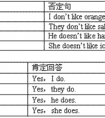Every means _____ prevent the water from _____. [ ]A. are used to; polluting B. get used to; pollution C. is used to; polluted D. is used to; being poll-九年级英语
动名词做主语时,不太常用 it 作先行主语,多见于某些形容词及名词之后。例如:
It is no use telling him not to worry.
常见的能用于这种结构的形容词还有:better,wonderful,enjoyable,interesting,foolish,difficult,useless,senseless,worthwhile,等。
注意:important,essential,necessary 等形容词不能用于上述结构。
3. 用于“There be”结构中。例如:
There is no saying when he'll come.很难说他何时回来。
4. 用于布告形式的省略结构中。例如:
No smoking ( =No smoking is allowed (here) ). (禁止吸烟)
No parking. (禁止停车)
5. 动名词的复合结构作主语
当动名词有自己的逻辑主语时,常可以在前面加上一个名词或代词的所有格,构成动名词的复合结构
(这时,名词或代词的所有格做动名词的逻辑主语)。
动名词的复合结构也可以在句中作主语。例如:
Their coming to help was a great encouragement to us.
二、动名词作宾语
1.作动词的宾语
某些动词后出现非限定性动词时只能用动名词作宾语,不能用不定式。常见的此类动词有:
admit, appreciate, excuse, stand, advise, allow, permit, avoid, consider, enjoy, finish
They went on walking and never stopped talking.他们继续走,说个不停。
I found it pleasant walking along the seashore.在海滩上走真是乐事。
Mark often attempts to escape being fined whenever he breaks traffic regulations.
每当马克违反交通规则时,他常常企图逃避罚款的处分。
2.作介词的宾语
We are thinking of making a new plan for the next term. 我们正考虑为下学期制定新的计划。
Shall we have a rest or get down to doing our work? 我们休息呢还是开始干活?
3.作形容词的宾语
The music is well worth listening to more than once. 这种曲子很值得多听几遍。
We are busy preparing for the coming sports meet. 我们正为马上到来的运动会忙着做准备。
三、动名词作表语
动名词作表语时句子主语常是表示无生命的事物的名词或what引导的名词性从句。
表语、动名词与主语通常是对等的关系,表示主语的内容,主语、表语可互换位置。
Your task is cleaning the windows. 你的任务就是擦窗户。
(Cleaning the windows is your task.)
What I hate most is being laughed at. 我最痛恨的就是被别人嘲笑。
(Being laughed at is what I hate most.)
四、动名词作定语
动名词作定语往往表示被修饰词的某种用途。如:
a walking stick =a stick for walking=a stick which is used for walking
a washing machine=a machine for washing=a machine which is used for washing
a reading room=a room for reading=a room which is used for reading
a measuring tape=a tape for measuring=a tape which is used for measuring
sleeping pills=pills for sleeping=pills which is used for sleeping
动名词也有时态和语态的变化,如表所示(以及物动词write为例),不及物动词没有语态的变化。
| 时态、语态 | 主动 | 被动 |
| 一般式 | writing | being written |
| 完成式 having written |
having been written |
1) 动名词做主语时,谓语动词为单数
2) 在动名词和不定式中,作为介词的宾语是动名词
3) 动名词的否定直接在其前加否定词,通过代词的宾格或所有格形式给出逻辑主语
例:I would appreciate you calling back this afternoon.
4) 有些词后只能接动名词
acknowledge;admit; advise;advocate;allow;appreciate; avoid; celebrate; consider; contemplate; defer; delay; deny;
detest; discontinue; dislike; dispute; enjoy; it entails; escape; excuse; explain; fancy; feel like; finish; forgive; can’t help;
hinder; imagine; it involves; keep; it means; mention; mind; miss; it necessitates; pardon; postpone; practice; prevent;
recall; report; resent; resist; risk; suggest; understand...
5) 另外还有一些接-ing形式的常用说法
it’s no good; it’s no/little/hardly any/ use; it’s not/hardly/scarcely use; it’s worthwhile; spend money/time; there’s no;
there’s no point in; there’s nothing worse than; what’s the use/point
6) 有些词后面加不定式和动名词均可
remember,forget,try,stop,go on,continue,stop,regret,cease,mean后面均可用不定式和-ing形式,但意义截然不容。
例:remember to do/doing:
①I remembered to post the letters.(指未来/过去未来将要做的动作)
②I remembered posting/having posted the letters.(我记得做过这个动作)
forget与remember的用法类似。
regret的用法:
①I regret to inform you that…(我很遗憾地通知你……)
②I regretted having left the firm after twenty years.(为了“二十年前的离开”而遗憾。)
try to(努力)与try +–ing(试验):
①You really must try to overcome your shyness.
②Try practicing five hours a day.
考点名称:主谓一致
- 英语中的一致主要包括主语和谓语在人称和数上的一致、时态一致、名词和其代词的一致。
主语和谓语保持一致叫主谓一致,即谓语动词的形式必须随着主语单、复数形式的变化而变化。 - 主谓一致原则:
1、语法上的一致
所谓语法一致原则,即主语和谓语的语法形式在人称和数上取得一致。
谓语的单、复数形式依据主语的单、复数形式而定:主语为复数,谓语动词用复数;主语为单数或者是不可数名词,谓语动词用单数。
China belongs to the Third World. 中国属于第三世界。
We are sure he will come. 我们肯定他会来。
使用语法一致的情况
(1)当主语是and,both…and连接的并列结构
如果主语指的是两个或两个以上的人或物,则谓语动词用复数。
My mother and I have seen the film. 我妈妈和我已看过这部电影。
Both rice and wheat are grown in this part of China. 在中国的这个地方既种稻子又种小麦。
注意:由and连接的并列主语前面分别有each,every,no修饰时,其谓语动词用单数形式。
Every boy and every girl has to receive education in our country. 在我国每一个男女孩子都得受教育。
No student and no teacher was invited to the party. 师生没有被邀请参加晚会。
(2)主语后面接说明主语的修饰语
主语后面接说明主语的修饰语如:
with,along with,together with,as well as,like,rather than,but,except,besides,including,in addition to,
谓语动词不受修饰成分的影响,仍保持同主语一致的关系。
The teacher with two students was at the meeting. 那位老师和两个学生参加了会议。
The girl as well as the boys has learned to drive a car. 这个姑娘和男孩子一道,也学会了开汽车。
A library with five thousand books is offered to the nation as a gift.一个有5000册书的图书馆作为礼物赠送给了国家。
E-mail, as well as telephones, is playing an important part in daily communication.电邮和电话在日常的通信中起着很重要的作用。
Nobody but Jane knows the secret.只有简知道这个秘密。
All but one were here just now. 刚才除了一个人外都来了。
(3)非谓语动词或从句作主语
非谓语动词 (动词的-ing形式、不定式)或从句作主语时,谓语一般用单数形式。
When and where to build the new factory is not decided yet.什么时候在什么地方建新工厂还没定下来。
Checking information is very important. 核实事实是非常重要的。
To learn foreign languages is not easy. 学习外语并非易事。
When we will hold the meeting is not decided yet. 我们何时开会尚未决定。
注意:当what引导主语从句或由 and连接两个动词不定式或动名词作主语时,谓语动词的数应根据意义一致的原则来决定。
What we need here is money.我们这里需要的是资金。
What we need here are workers.我们这里需要的是工人。
Lying and stealing are immoral.说谎与偷窃是不道德的。
(4)each和复合不定代词作主语
each和some/any/no//every十body/one/thing构成的复合不定代词:
- 最新内容
- 相关内容
- 网友推荐
- 图文推荐
上一篇:He improves his English _____ aloud every morning. [ ]A. reads B. with readingC. by reading D. to read -九年级英语
下一篇:I study math by_______lots of exercises. [ ]A. doing B. didC. do D. does-九年级英语
零零教育社区:论坛热帖子
| [家长教育] 孩子为什么会和父母感情疏离? (2019-07-14) |
| [教师分享] 给远方姐姐的一封信 (2018-11-07) |
| [教师分享] 伸缩门 (2018-11-07) |
| [教师分享] 回家乡 (2018-11-07) |
| [教师分享] 是风味也是人间 (2018-11-07) |
| [教师分享] 一句格言的启示 (2018-11-07) |
| [教师分享] 无规矩不成方圆 (2018-11-07) |
| [教师分享] 第十届全国教育名家论坛有感(二) (2018-11-07) |
| [教师分享] 贪玩的小狗 (2018-11-07) |
| [教师分享] 未命名文章 (2018-11-07) |

![Which of the following can you probably see in the meeting room? [ ]A. B. C.D. -七年级英语](http://www.00-edu.com/d/file/ks/4/2/dongmingci/2020-01-08/small97361980a56115e1c9237567439904fe1578422951.jpg)

![—Can the boy finish_____ the book in about a week? —I think he can. [ ]A. read B. reading C. to read D. reads -八年级英语](http://www.00-edu.com/d/file/ks/4/2/dongmingci/2020-01-08/smallfa4d713075e249356362fe7392193a301578421751.png)


